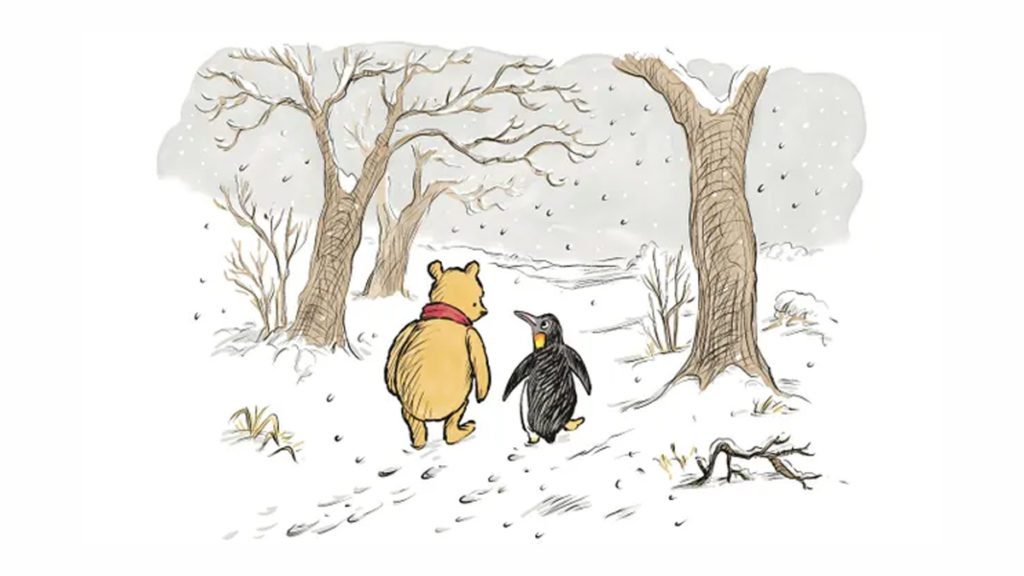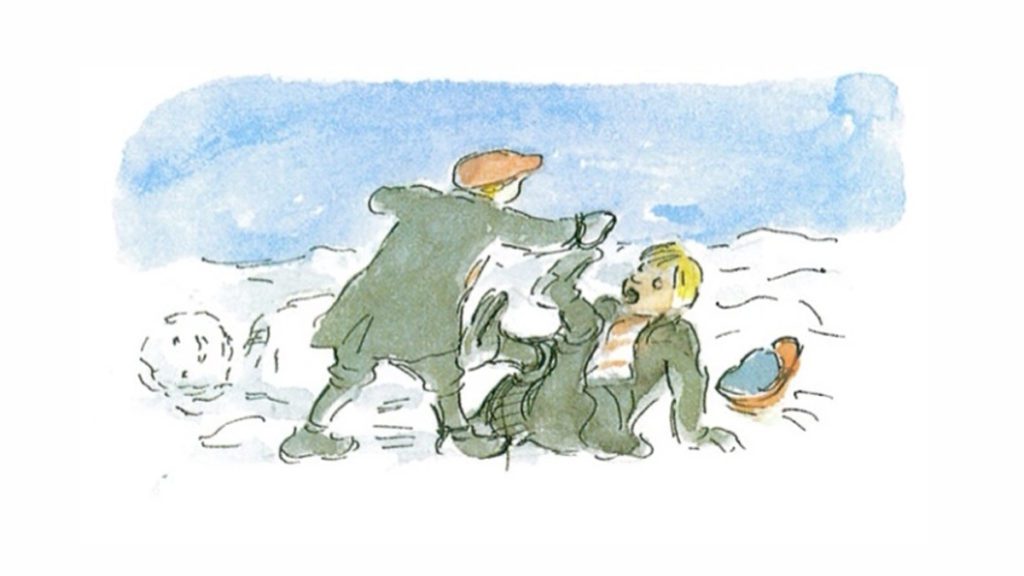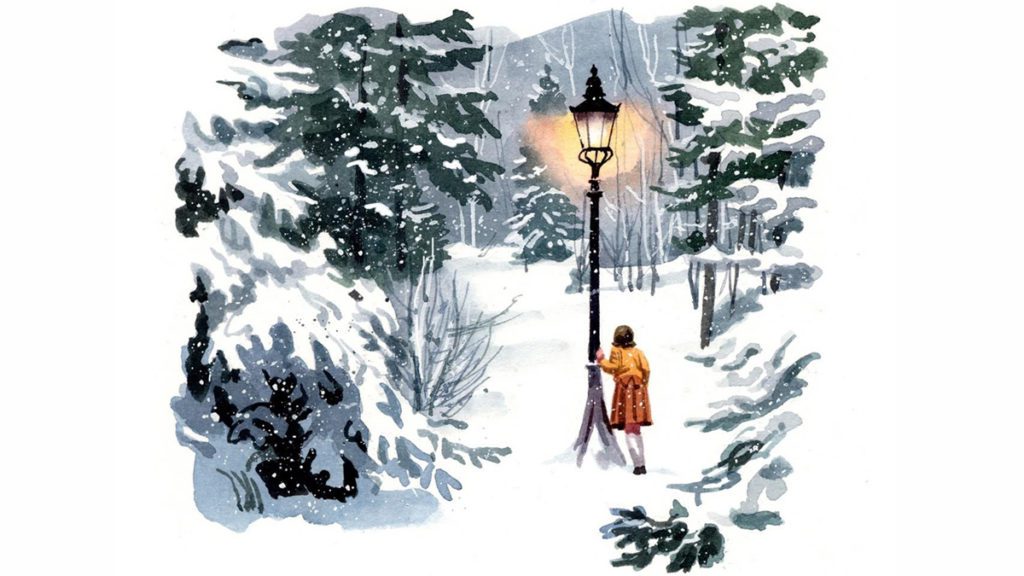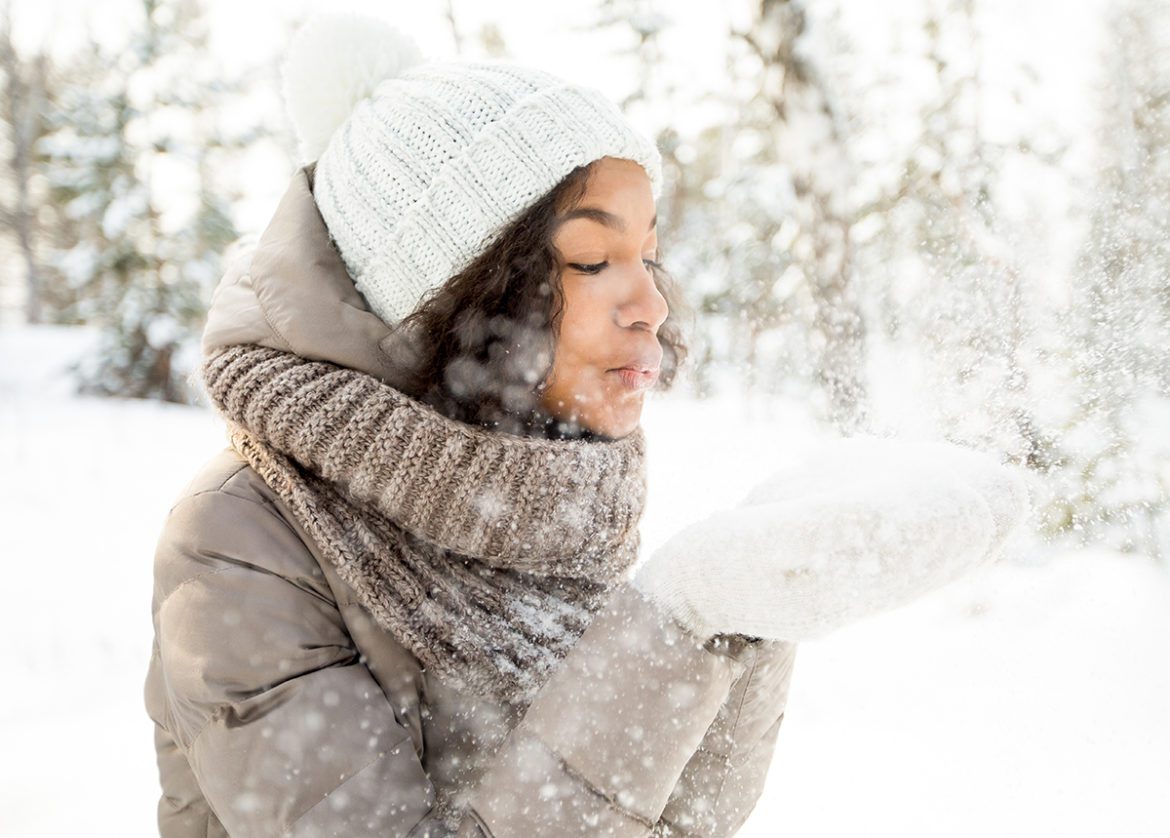And What Dylan Thomas, Some Other “Friends,” and I Think About It
I WONDER WHETHER IT WILL SNOW this winter. I’m new to these parts, and am told it hardly ever does. It always snows where I come from, in the far north of New England. The first dusting arrives on Father Winter’s coattails in November and lingers till April, when Spring breaks through. A winter without snow seems very strange to me. So, I reached out to some old friends to get their thoughts on the matter.
“It always snows in the Hundred Acre Wood,” Alan, who I’d known since childhood, explained.
“Yes,” I replied, “but where is the Hundred Acre Wood, exactly?”
“East Sussex, along the English Channel. I was captain of the Hartfield Home Guard there during the Second World War. Our place was Cotchfold Farm, on the north edge of Ashdown Forest, in the Five Hundred Acre Wood but I pared it down a bit and called it the Hundred Acre Wood when my son, Christopher Robin, was Very Young and accompanied me on my daily walk in the wood. He always brought Pooh Bear along. Why, I recall…
One day when Pooh Bear had nothing else to do, he thought he would do something, so he went round to Piglet’s house to see what Piglet was doing. It was still snowing as he stumped over the white forest track, and he expected to find Piglet warming his toes in front of his fire, but to his surprise he saw that the door was open, and the more he looked inside the more Piglet wasn’t there.
“He’s out,” said Pooh sadly. “That’s what it is. He’s not in. I shall have to go a fast Thinking Walk by myself. Bother!”
But first he thought that he would knock very loudly just to make quite sure . . . and while he waited for Piglet not to answer, he jumped up and down to keep warm, and a hum came suddenly into his head, which seemed to him a Good Hum, such as is Hummed Hopefully to Others.
The more it snows
(Tiddely pom),
The more it goes
(Tiddely pom),
The more it goes
(Tiddely pom)
On snowing.
And nobody knows
(Tiddely pom),
How cold my toes
(Tiddely pom),
How cold my toes
(Tiddely pom),
Are growing.
“That’s a lovely story, Alan,” I said. “But you know, you really ought to write down some more.”
 Fresh prints … Winnie-the-Pooh and Penguin, in an illustration from The Best Bear in All the World. Illustration: Mark Burgess/Egmont Publishing
Fresh prints … Winnie-the-Pooh and Penguin, in an illustration from The Best Bear in All the World. Illustration: Mark Burgess/Egmont Publishing
I THEN HEADED NORTH, TO WALES, where it snows, and it snows. Above the town of Laugharne, the ruins of a great medieval castle stand guard over the River Tâf before it marries the sea at Carmarthen Bay. A friend of mine lived in a boathouse on “the heron-priested shore” and wrote some of his best poetry in a nearby shed perched atop a cliff-ledge.
“Dylan,” I said, “Your writing always gives me so much pleasure. Tell me again about your childhood, and how it snowed.”
“Let’s go down to Browns, and I shall recount the snow of my childhood over a pint or two of Felinfoel,” and a broad smile spread beneath his round, red Santa nose. So we walked along the hedge-hewn lane to Browns, which he frequented daily and gave their phone number out as his own. “Two Double Dragons,” he ordered, “the finest ale in all Wales!”
“Now, tell me about the snow…”
One Christmas was so much like another, in those years around the sea-town corner now and out of all sound except the distant speaking of the voices I sometimes hear a moment before sleep, that I can never remember whether it snowed for six days and six nights when I was twelve or whether it snowed for twelve days and twelve nights when I was six.
“I know how that goes,” I mused. “It’s that way in January and February, back home. Oh! I’m sorry…I didn’t mean to interrupt. Please go on.”
Years and years ago, when I was a boy, when there were wolves in Wales, and birds the color of red-flannel petticoats whisked past the harp-shaped hills, when we sang and wallowed all night and day in caves that smelt like Sunday afternoons in damp front farmhouse parlors, and we chased, with the jawbones of deacons, the English and the bears, before the motor car, before the wheel, before the duchess-faced horse, when we rode the daft and happy hills bareback, it snowed and it snowed. But here a small boy says: “It snowed last year, too. I made a snowman and my brother knocked it down and I knocked my brother down and then we had tea.”
 A Child’s Christmas in Wales by Dylan Thomas
A Child’s Christmas in Wales by Dylan Thomas
MY QUEST FOR SNOW carried me further north, then veered to the west as I made my way to see my dear friend Jack. I found him on St. John’s Point, looking toward Hare’s Gap, across the Irish Sea, to the Mountains of Mourne.
“I cannot linger here long,” he said, “but I wanted you to see this place, and how the snow covers the Mourne like a white wooly blanket. There lies my Narnia.”
“Must you return to Cambridge?”
“Cambridge is my home,” he said. “As much a home as home ever could be after my mother died. I was just a lad of ten. ‘ With my mother’s death all settled happiness, all that was tranquil and reliable, disappeared from my life. There was to be much fun, many pleasures, many stabs of Joy; but no more of the old security. It was the sea and islands now; the great continent had sunk like Atlantis.’ ”
His dancing eyes dulled and the corners of his full mouth turned downward as his pale memory of his beloved mother washed over his soul like the cold-grey waves upon the cragged rocks below.
“Tell me about Narnia,” I blurted out, anxious to quell his sadness. “Tell me about the snow.”
Immediately he brightened. “Lucy, the youngest of the four, discovered Narnia, you know.”
“Yes, in the back of the wardrobe! Thank goodness those warm fur coats were hanging up, otherwise the children would have caught their death of cold!”
“Well, she pushed her way past the coats…”
But instead of feeling the hard, smooth wood of the floor of the wardrobe, she felt something soft and powdery and extremely cold. “This is very queer,” she said, and went on a step or two further. And then she saw that there was a light ahead of her; not a few inches away where the back of the wardrobe ought to have been, but a long way off. Something cold and soft was falling on her. A moment later she found that she was standing in the middle of a wood at night-time with snow under her feet and snowflakes falling through the air. Lucy felt a little frightened, but she felt very inquisitive and excited as well. She looked back over her shoulder and there, between the dark tree trunks; she could still see the open doorway of the wardrobe and even catch a glimpse of the empty room from which she had set out. (She had, of course, left the door open, for she knew that it is a very silly thing to shut oneself into a wardrobe.) It seemed to be still daylight there. “I can always get back if anything goes wrong,” thought Lucy. She began to walk forward, crunch-crunch over the snow and through the wood towards the other light.
 ILLUSTRATION: MATTHEW COOK
ILLUSTRATION: MATTHEW COOK
I CLOSED THE BOOKS I had cherished since childhood, and my eyes, and drifted off to “that place between sleep and awake, the place where you can still remember dreaming?” I returned to the snow-covered days of my past where, on wintry evenings, I read my blue-bound copy of Winnie the Pooh and oatmeal-covered The House on Pooh Corner again and again and, a half-century later, would read them to my grandchildren and see something of my own childhood reflected in the wonderment of their eyes. Next came the memory of my father putting a record on the record player, and the crackling second before the needle picked up the rich, heavily hewn accent of the great Welsh bard, Dylan Thomas, reading his splendid autobiographical prose, “A Child’s Christmas in Wales.” How his words filled my imagination and warmed my young heart, and still do. Then on to Narnia and The Lion, the Witch, and the Wardrobe, where I escaped as a young girl through the wardrobe and pages of C.S. Lewis’s books to an imaginary world I believe existed and, in a spiritual way, still does.
And when I opened my eyes, it was snowing! Snowflakes like dusting powder drifted gently from the darkening, low-slung sky and settled on the mirror-surface of our pond. I rubbed my eyes, but when I opened them again, realized it was not snow at all; the last leaves of autumn lit upon the water and as lovely as it was, it made me wistful.
It will always snow in New England and who knows? Snow may even sweep south to Pinehurst. But it will snow in the Hundred Acre Wood, and in a seaside town in Wales, and mystical Narnia, and in that secret compartment in my heart where I store my most precious memories, and can take them out whenever I want to bask in their golden glow.
Written by Laurie Bogart Wiles

